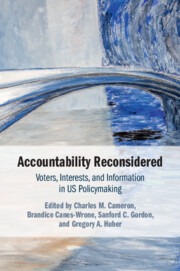Book contents
- Frontmatter
- Dedication
- Contents
- Figures
- Tables
- Contributors
- Acknowledgments
- 1 Introduction
- Part I Candidate Evaluation and Selection
- Part II The Media and The Informational Environment
- 6 Local Newspapers and Ideological Accountability in US House Elections
- 7 Inequality, or Invisibility and Inaccuracy? How Local Newspapers Cover the Occupational Backgrounds of Congressional Incumbents and Challengers
- 8 Congressional Accountability in the Contemporary Media Environment: Arguments, Data, and Methods
- Part III Policymaking, Information Provision, and Accountability
- Part IV Outside The Public Eye? Private Interests and Policymaking
- Bibliography
- Author Index
- Subject Index
8 - Congressional Accountability in the Contemporary Media Environment: Arguments, Data, and Methods
from Part II - The Media and The Informational Environment
Published online by Cambridge University Press: 09 February 2023
- Frontmatter
- Dedication
- Contents
- Figures
- Tables
- Contributors
- Acknowledgments
- 1 Introduction
- Part I Candidate Evaluation and Selection
- Part II The Media and The Informational Environment
- 6 Local Newspapers and Ideological Accountability in US House Elections
- 7 Inequality, or Invisibility and Inaccuracy? How Local Newspapers Cover the Occupational Backgrounds of Congressional Incumbents and Challengers
- 8 Congressional Accountability in the Contemporary Media Environment: Arguments, Data, and Methods
- Part III Policymaking, Information Provision, and Accountability
- Part IV Outside The Public Eye? Private Interests and Policymaking
- Bibliography
- Author Index
- Subject Index
Summary
In Chapter 8, Gregory Huber and Patrick Tucker provide a critical overview of the role of media in informing citizens about candidates. They identify important developments in the media landscape, including the decline in local print media, the expansion of national newspapers and cable TV into local markets, and the growth of the Internet. The chapter begins by discussing the theoretical relationship between these developments and the nature of coverage of politics, focusing on how this shapes the incentives of both incumbents and individuals running for office. Then turning to a review of prior empirical work, the authors highlighting areas where we currently lack a solid empirical foundation, for example, local television coverage and more recent newspaper coverage. Finally, they propose an agenda for a unified cross-media data collection project on citizens’ political informational environments vis-à-vis Congress.
- Type
- Chapter
- Information
- Accountability ReconsideredVoters, Interests, and Information in US Policymaking, pp. 173 - 194Publisher: Cambridge University PressPrint publication year: 2023

